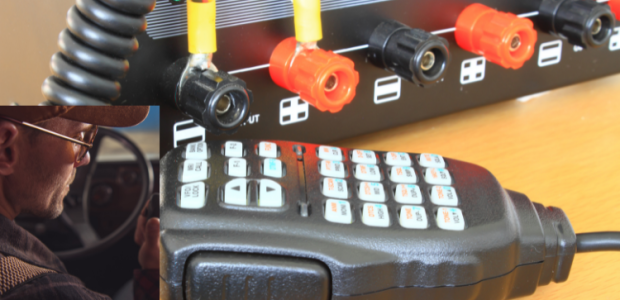
CB radios, or Citizens Band radios, are two-way radio communication devices that operate on a specific set of 40 channels within the CB radio band. These radios are designed for short-distance communication and are widely used by both individuals and various groups for various purposes. Here’s an overview of CB radios, where they can be used, and their benefits:
Overview of CB Radios:
- Frequency Band: CB radios operate on the Citizens Band, a portion of the radio frequency spectrum allocated by the government for public use.
- Channels: CB radios have 40 channels, each with a specific frequency. Channel 9 is reserved for emergencies, and channel 19 is commonly used for trucker communication.
- Power: CB radios typically have a power output of 4 watts, which provides relatively short-range communication.
- Antennas: External antennas can be used to extend the range of CB radios.
- License-Free: In many countries, CB radio use is license-free for individuals, making it accessible to the general public.
Where CB Radios Can Be Used
- Trucking: CB radios have long been used by truck drivers to communicate with each other on the road. Channel 19 is often used for trucker communication to share information about road conditions, traffic, and more.
- Off-Roading: CB radios are popular among off-road enthusiasts who travel in convoys or explore remote areas. They use CB radios to maintain communication within the group.
- Recreational Vehicles (RVs): RV owners sometimes use CB radios to communicate with other RVs on the road or at campgrounds.
- Emergency Communication: CB radio channel 9 is designated for emergency communication. It can be used to call for help or report accidents when no other means of communication are available.
- Boating: Some boaters use marine CB radios for communication on the water, especially in areas where VHF marine radios may not have coverage.
- CB (Citizens Band) radios have a range of uses across different contexts and industries. Here are some common uses of CB radios:
- Trucking and Transportation: CB radios have a long history of use in the trucking and transportation industry. Truckers use CB radios to communicate with each other about traffic conditions, road hazards, weather updates, and to stay connected with fellow drivers during long hauls.
- Emergency Communication: CB radios can be valuable for emergency communication, especially in areas with limited cellular coverage. They are often used by first responders, off-road enthusiasts, and individuals in remote locations where other forms of communication may not be available.
- Recreational Off-Roading: Off-road enthusiasts, such as those who engage in activities like four-wheeling or trail riding, often use CB radios to stay in contact with their group members and share information about trail conditions and obstacles.
- Boating and Marine: CB radios, especially marine-band CB radios, are used by boaters for communication on the water. They can be used to call for assistance, report emergencies, or communicate with other boaters in the vicinity.
- Construction and Industry: In construction sites and industrial settings, CB radios can facilitate communication among workers, supervisors, and equipment operators. They are valuable for coordinating tasks, ensuring safety, and responding to emergencies.
- Off-Road Trucking: In addition to long-haul trucking, CB radios are used by drivers of off-road or construction trucks to communicate with each other on job sites. This is crucial for coordinating the movement of heavy equipment and ensuring safety.
- Traveling in Convoy: CB radios can be used by groups of travelers, such as caravans or convoys of vehicles, to maintain communication during long journeys. This can help with navigation, coordination, and ensuring that everyone stays together.
- Community and Hobby Groups: CB radios are used by various hobbyist and enthusiast groups, such as radio clubs, off-road clubs, and trucking associations, to stay connected and share information related to their interests.
- Farm and Agriculture: In rural areas, CB radios are sometimes used by farmers and agricultural workers to communicate across large fields or between different parts of a farm.
- Public Events and Security: Event organizers and security personnel may use CB radios to coordinate activities during public events, festivals, or large gatherings.
- It’s important to note that while CB radios offer certain advantages, they have limited range compared to other communication technologies like cell phones and two-way radios. CB radios typically have a range of a few miles, depending on terrain and antenna height. However, they remain a valuable tool in specific situations where other forms of communication may be impractical or unavailable.
Benefits of CB Radios:
- Simple Operation: CB radios are relatively easy to use, making them accessible to people without technical expertise.
- Short-Range Communication: While limited in range, CB radios are effective for short-distance communication, making them ideal for situations like caravanning, off-roading, or keeping in touch with nearby vehicles.
- Emergency Use: Channel 9 on CB radios is dedicated to emergency communication, providing a means to call for help or report emergencies.
- No Ongoing Costs: Unlike some other communication systems, CB radios do not require ongoing service fees or subscriptions.
- Group Communication: CB radios allow group communication on a single channel, which can be useful for coordinating activities or staying connected during travel.
It’s important to note that the effectiveness of CB radios depends on factors like terrain and interference, and their range is typically limited to a few miles. For longer-range communication, other radio systems or cellular devices may be more suitable. Additionally, the popularity and usage of CB radios may vary by region and application.
